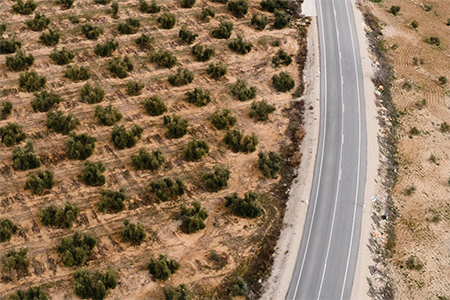
Author

Omar Sami
Attorney at Law (Germany) I Legal and Tax Consultant (UAE) I Managing Partner
Reform Enables Foreign Ownership in Designated Zones – Restrictions for Makkah and Madinah Remain in Place
I. Introduction
Effective January 2026, Saudi Arabia has published a new law allowing foreign natural and legal persons to acquire real estate rights in the Kingdom. The law, which comes into force after a six-month transition period, provides for clear territorial restrictions as well as new regulations on registration obligations, acquisition conditions and sanctions. Strict access restrictions continue to apply to Makkah and Madinah – with selective exceptions for Muslim individuals or operational purposes.
II. New Framework
1. On July 25, 2025, Saudi Arabia published the new Law on the Acquisition and Investment in Real Estate by Non-Saudis in the official gazette “Umm Al-Qura”. The regulation replaces the previous legal basis from 2000 (Royal Decree No. M/15) and represents a significant step towards the realignment of the Saudi real estate market.
In the future, foreigners – including private individuals, companies, non-profit organizations and diplomatic missions – will be able to acquire real estate ownership or other rights in rem (such as usufruct or building rights) in zones defined by the Council of Ministers in coordination with the General Authority for Real Estate and the Economic Council. A specification of these zones – probably in economically strategically important regions such as Riyadh, Jeddah and the Eastern Province – is still pending.
2. Private individuals with a valid residence permit will be allowed to acquire a residential property for their own use in the future, provided that it is not located in areas closed to foreigners. More extensive rights apply to companies, in particular unlisted companies with foreign shareholders – including in the cities of Makkah and Madinah, if the use demonstrably serves operational purposes or the accommodation of employees.
Listed companies and foreign investment vehicles may acquire real estate, provided they comply with the existing regulations of the Saudi Arabian Capital Market Authority. Separate provisions apply to diplomatic missions, which require, among other things, the approval of the Ministry of Foreign Affairs and reciprocity with the country of origin.
All transactions are subject to mandatory registration in the national real estate register. Rights only become legally effective upon completion of registration. In addition, a tax of up to 5% is payable on property transfers. Violations – for example, through false information or disregard of conditions – can be sanctioned with fines of up to SAR 10 million or a forced sale.
3. The specific implementing provisions are to be published within six months and will include, among other things, details on geographical restrictions, property ceilings, time limits on rights of use and documentation requirements.
The law is part of Saudi Arabia’s economic diversification strategy within the framework of “Vision 2030” and is intended, among other things, to promote international investment in urban development projects, the tourism sector and technological future industries. Projects such as NEOM, the Red Sea Resort and the development of downtown Madinah could become significantly more attractive to foreign investors as a result of the new regulation.
III. Summary
With the entry into force of the new Real Estate Law in January 2026, Saudi Arabia is repositioning itself in the regional competition for international capital. The regulation not only brings transparency to the previously fragmented legal situation, but also offers a clearly structured access for foreign investors. Nevertheless, market entry remains tied to specific requirements and approval procedures, in particular with regard to location requirements and the earmarking of real estate use.
For companies with a presence or expansion interest in the Kingdom, early legal advice is recommended on the selection of permissible investment locations, the structuring of rights of use and the structural integration of foreign investments in compliance with local requirements.
TME Legal Consultants






